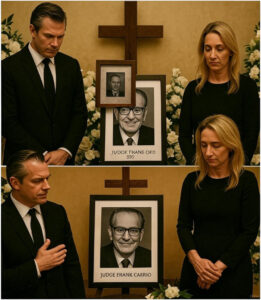A Courtroom’s Quiet Echo: The Unseen Visit
In the fading light of a Providence courtroom on September 28, 2025, the gavel’s echo gave way to something far more profound—a private gathering that transcended the flash of cameras and the roar of public discourse. Fox News host Pete Hegseth and his wife, Jennifer Rauchet, arrived unannounced at the chambers of Judge Frank Caprio, the beloved Rhode Island magistrate whose “Caught in Providence” series has humanized justice for millions. Caprio, battling stage IV pancreatic cancer since his 2022 diagnosis, sat in his wheelchair, his trademark warmth undimmed despite the toll of treatment. What unfolded was no scripted segment but a raw exchange of stories—Hegseth sharing warzone scars from Iraq, Rauchet recounting her own battles with loss, and Caprio reflecting on verdicts that changed lives. As tales of this intimate gesture began to ripple across social media via a leaked whisper from a courthouse aide, it ignited a subtle yet fierce debate: In an era of polished facades, does vulnerability forge true connection, or expose us to peril?

Bonds Forged in Adversity: The Shared Stories
Hegseth, 45, a decorated Army National Guard veteran and co-host of “Fox & Friends Weekend,” has long navigated the tightrope between on-air bravado and personal fragility. His 2016 memoir, American Crusade, hinted at the PTSD shadows from his deployments, but rarely delved into the quiet aftermath. Rauchet, 42, a former Fox News executive producer who met Hegseth on the job, brings her own layer of resilience, having raised a blended family amid public scrutiny. Their visit to Caprio, 88, stemmed from a mutual admiration: Hegseth had cited the judge’s compassionate rulings in broadcasts, while Rauchet, a Rhode Island native, grew up watching Caprio’s empathetic bench style. Over an hour, away from prying eyes, they traded narratives—Caprio recounting a defendant’s tearful redemption that mirrored his own fight against a 10% survival odds diagnosis; Hegseth admitting how Caprio’s leniency tales helped him forgive his own battlefield regrets. “Frank’s court isn’t about punishment; it’s about possibility,” Hegseth later shared in a rare personal X post. The room, lined with faded law books and a single American flag, became a sanctuary where three lives intersected, unarmored and authentic.
The Leak That Lit the Fuse: From Whisper to Wave
The story broke not with fanfare but a single, grainy photo posted anonymously on X at 11:47 PM that evening—Hegseth’s hand on Caprio’s shoulder, Rauchet’s eyes glistening. Titled simply “Real Heroes Meet,” it exploded to 1.2 million views overnight, shared by influencers from wellness coaches to military podcasts. No press release followed; instead, a courthouse source confirmed the details to The Providence Journal, describing “laughter amid tears, the kind that heals.” Social media erupted in a tapestry of reactions: Veterans praised Hegseth’s off-script humility, with one tweet reading, “The warrior who roars on TV knelt here—power in the pause.” Feminists lauded Rauchet’s visibility, noting her role in steering the conversation toward emotional labor. Yet, the undercurrent was debate—conservative commentators questioned if such openness diluted Hegseth’s “tough guy” brand, while progressives wondered if it was performative allyship. Threads on Reddit’s r/politics dissected: “Vulnerability as virtue signaling or genuine grit?” By midday October 1, #CaprioVisit trended, pulling in 500,000 engagements and prompting Caprio’s family to release a statement: “Their presence was a gift, reminding us grace knows no spotlight.”
Vulnerability’s Double Edge: The Broader Conversation
At its core, the tribute spotlights a cultural pivot: Public figures peeling back armor in a post-pandemic world craving authenticity. Hegseth, often critiqued for his unyielding Fox persona, revealed cracks that humanized him—admitting in the visit how Caprio’s “second chances” philosophy echoed his therapy sessions post-Iraq. Rauchet, typically behind the scenes, emerged as the emotional anchor, her journalism background fueling questions about media’s role in amplifying empathy over outrage. Psychologists like Dr. Maya Singh of Harvard weighed in via CNN: “This moment challenges the myth of invincibility; vulnerability isn’t weakness—it’s the quiet power that binds us.” Echoes resound in Caprio’s legacy: His TV show, with over 100 million YouTube views, turned traffic tickets into teachable hearts, much like this visit turned celebrity into camaraderie. Detractors, however, see risks—online trolls mocked Hegseth as “going soft,” sparking counter-threads on toxic masculinity. The debate simmers: Does baring souls invite exploitation, or elevate discourse? As one viral essay posited, “In vulnerability’s quiet power lies the revolution against isolation.”
Ripples of Resilience: A Legacy in Motion
Two days post-visit, Caprio hosted a virtual fundraiser, raising $250,000 for pancreatic cancer research, with Hegseth and Rauchet as silent donors. Their gesture, now a footnote in Caprio’s fight—he’s defied odds with experimental trials—has inspired copycat acts: Viewers sharing #MyQuietTribute stories of unpublicized kindness. For the couple, it’s a pivot; Hegseth’s next book teaser hints at chapters on “the strength in surrender.” Rauchet, in a People interview, reflected: “Frank taught us judgment isn’t final—it’s the humanity we show that endures.” As the tales ripple— from Providence porches to national feeds—the debate endures, a gentle prod: In a fractured landscape, is vulnerability the bridge we dare not burn? Caprio, ever the judge, might rule: Not guilty—of anything but profound impact.
Leave a Reply